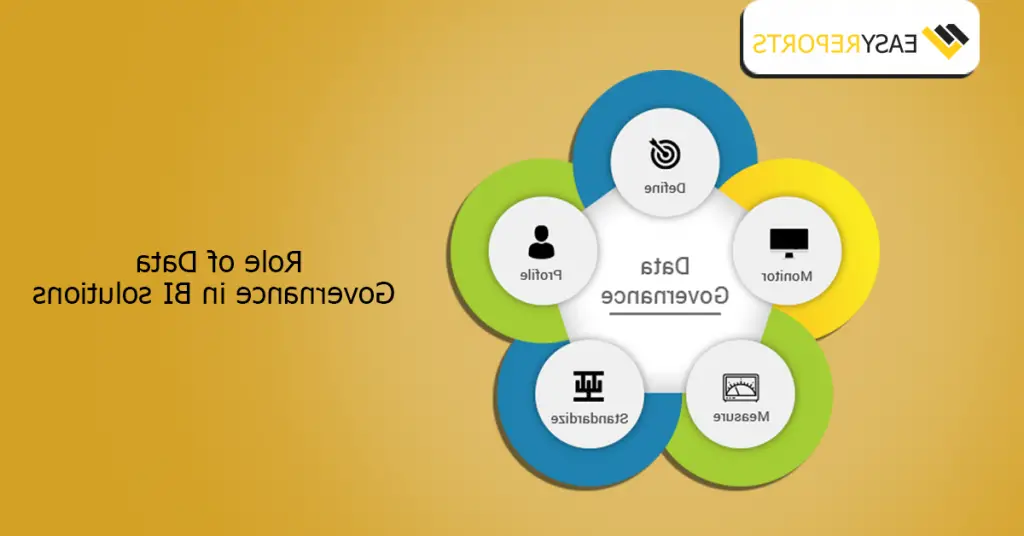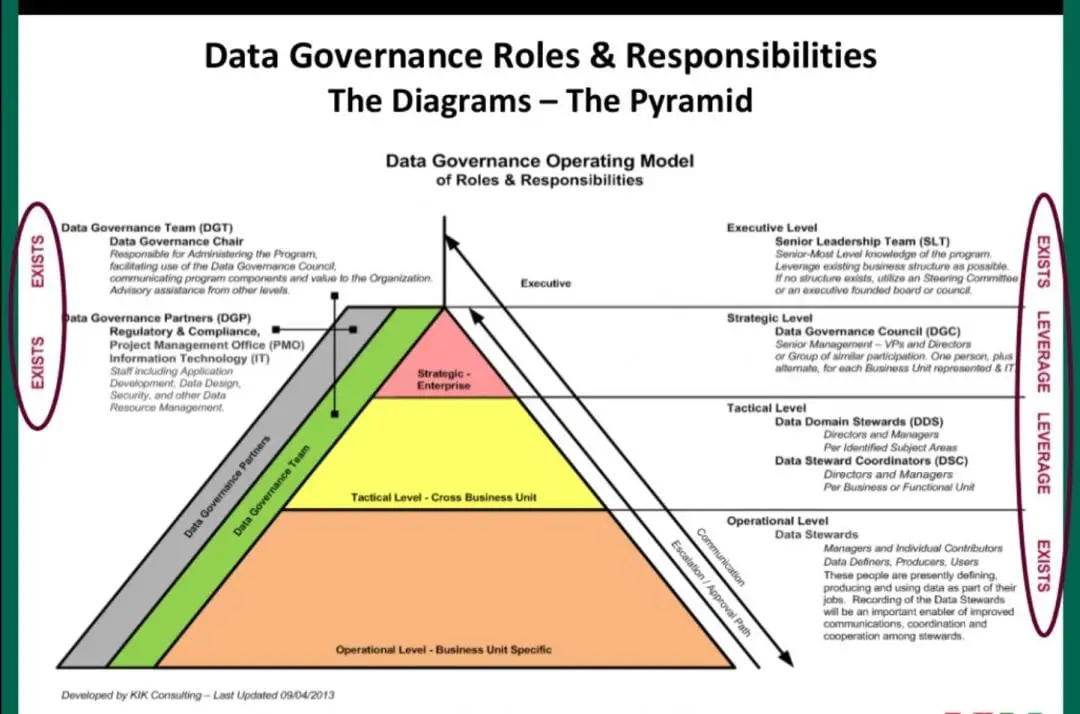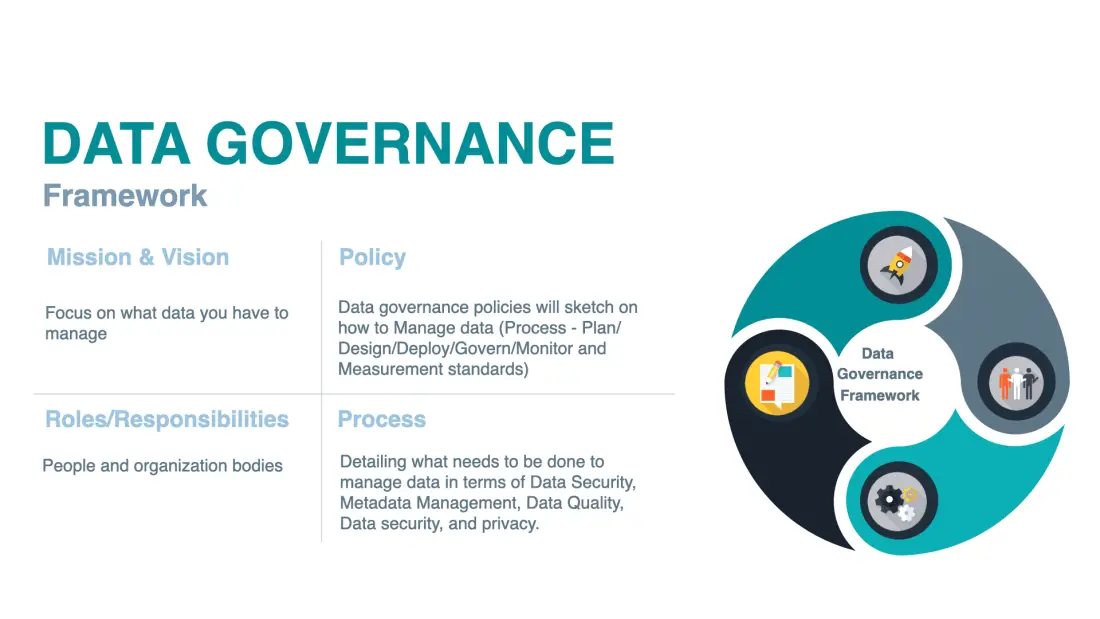Ensure A Data Governance Strategy Is Rooted In Accountability
Basing a data governance strategy on accountability will assure stakeholders that the right governance processes are in place. When users are accountable for their actions with data governance, users confidence in the quality of data will increase. This will lead to increased data productivity across the organization.
To achieve a data governance strategy rooted in accountability, it is best to start with evaluating the current accountability model your company follows for data governance. Compare that model with the way your data decisions are currently made in your organization, and then understand why you do so.
Once you figure out the difference between what is happening and what should be happening, you can identify the business impact and take action on your current accountability model. Here are some steps your organization can take to ensure data governance is rooted in accountability:
- Create a centralized team or person responsible for data governance in your organization.
- Work with internal stakeholders to agree on an approach to data governance.
- Work with tools to deploy your data governance model that works for both systems and people.
- Review and reassess your data governance strategy as often as possible.
You need someone internally to take responsibility for the initiative. Great analytics isnt plug and play but once you get it set up properly with Snowplow, it just works!!
Ty W, VP Operations, Anon
Ensure Your Governance Team Know The Data Theyre Working With
Once your data governance plan is underway, its essential to employ data governance professionals who are familiar with the context of the data that they will be working with. For example, suppose your organization works in cancer research. In that case, people who have experience in the field and with the kinds of data involved may be more qualified to manage governance than employees with no background in cancer research and treatment. One of the most critical tasks data governance professionals undertake is data organization and upkeep. So it is helpful for them to glance at any given piece of data and have a clear idea of what it is, what it could mean and where it should go.
Anyone Who Accesses Or Uses Data
Their role: Actively following new policies and speaking up when a policy makes their job more difficult.
Much like managers, those using or accessing data need to have the ability to communicate their needs.
Going back to my previous example of the sales team, its likely that a sales rep will communicate the lack of access to client data to their sales manager.
Plenty of lower-level employees handle data on a daily basis. As such, they have the best idea of what data theyll need to access, and how they need to use it.
Your tech team, especially, should feel empowered to speak up. If something goes wrong when backing up data or if they notice suspicious activity on your network, theyll be the first to know.
How data governance affects them: The policies that the data governance council implements directly affects many employees. Especially if they change the way they do their jobs, employees needs should be the DGCs highest priority after data security.
Don’t Miss: Dental Grants For Seniors
Create A Collaborative Data Governance Environment For Your Organization
Data leaders should be brought into collaborative data governance initiatives throughout the organization that way, it is not siloed in one part of the organization. To make data governance a collaborative task, it is best to assist employees in understanding the role they play in data governance.
To achieve a collaborative environment, organizations have relied on storytelling, leading to a more productive environment. When organizations tell stories, it connects with personal experience, their roles in the business, and their feelings regarding the value they contribute.
Organizations should empower individuals to take ownership of data governance and explain the importance of upholding it within the organization. It is also important for organizations to encourage a culture of transparency around what data governance looks like in the organization.
Snowplow is open source, which means that we can have confidence in it we can look at the code and figure out whats going on or change things. We want to be able to control and own all of our data.
Who Should Handle Data Governance

Executing data governance effectively requires the collaboration of three parties:
- IT
- The business
- Data governance office or data governance committee
IT owns technologies, creates simple technical checks, ensures technical processes work , and monitors changes in data structures. At the same time, IT lacks the end-to-end understanding of business processes and looks at data from a purely technical perspective.
The business understands the meaning of data. They are instrumental in creating checks and business glossary content. In the end, they benefit the most from data governance. However, they have a view of data limited by their product or business process.
Finally, the data governance team looks at all enterprise data and owns methodologies and processes for effective management. This team’s approach to issues in data is proactive. However, they lack specific knowledge of business processes and systems or specific data.
The three teams help each other with their strengths and cover other teams’ weaknesses. Once the data governance is set in place, it’s primarily maintained and enforced by a data steward or a data custodian.
Read Also: Trucking Business Grants
Data Governance Makes Data Meaningful
Data governance brings context to an organizations data.It enables teams to organize, document and evaluate the quality of available information assets. By defining terminologies, establishing controls, identifying responsibilities, and more, data governance makes sure all teammates have the context they need to trust data, access data, and develop valuable insights.
Align Data Governance To Specific Business Outcomes
It is crucial to align your business strategies and priorities with your data governance framework. More often than not, data governance efforts are not associated with business priorities. When data governance is not connected with business priorities, data leads are often not heard when it comes to decision-making.
Aligning data governance with specific business outcomes is attainable for organizations. It can be done by laying out attributable business metrics to stakeholders who work with data. Data governance decisions should reference both business and data metrics while relating those decisions to business goals.
Lets say a marketing team does not trust the data theyre working with they are not only unable to base their decisions on the data but are likely to take their data elsewhere. When data is siloed off, it is much harder to unify data within an organization, ultimately, leading to game-changing use cases never being turned into a reality.
Recommended Reading: City Of Las Vegas Government Jobs
Keep Pace With Change
Remember that data governance is not just a one-off project or program. Data needs to be dynamic. Data practices need to evolve as the company and market landscape evolve. Consistently check on the changing needs of business users. Invest in technology that automates data processes. Stay abreast of industry trends and ultimately remember the importance of data governance to accelerate digital transformation.
The Data Intelligence company
We accelerate trusted business outcomes by connecting the right data, insights, algorithms and people for all Data Citizens.
Related resources
What Is Data Governance In Artificial Intelligence
In short, Data governance helps an organization to better manage 5 things about data: Availability, usability, integrity, and security of their data. By using the right technologies DG can drive business values and support AI transformation. Technically speaking, it includes:
You May Like: Grants To Start A Trucking Business
Whos Responsible For Data Governance
Data governance teams are a common feature within enterprises these are becoming a standard function, given the growing demands for proper policies. These teams include business executives, IT professionals, and Data management experts familiar with the organizations data domains.
Some of the key participants in a data governance team include:
Data Governance Goals And Benefits
A key goal of data governance is to break down data silos in an organization. Such silos commonly build up when individual business units deploy separate transaction processing systems without centralized coordination or an enterprise data architecture. Data governance aims to harmonize the data in those systems through a collaborative process, with stakeholders from the various business units participating.
Another data governance goal is to ensure that data is used properly, both to avoid introducing data errors into systems and to block potential misuse of personal data about customers and other sensitive information. That can be accomplished by creating uniform policies on the use of data, along with procedures to monitor usage and enforce the policies on an ongoing basis. In addition, data governance can help to strike a balance between data collection practices and privacy mandates.
You May Like: Government Grants To Start Trucking Business
Data Governance Best Practices In Healthcare
So far, we have discussed the many unique challenges and opportunities that healthcare organizations face in managing their data. Now lets consider how leaders can incorporate data governance best practices to protect their patients sensitive information while also leveraging that data to improve operations and outcomes.
How Kloudio Can Help With Data Governance

Kloudio, as an organization, can help other companies make datadriven decisions, especially when it comes to meeting and maintaining compliance with data storage and other regulation policies. The idea is to ensure that data is stored securely, and accesses are regularly maintained to avoid any third-party misuse.
Kloudios tools are geared towards maintaining data secrecy and efficient report building. Each of their tools facilitate effective data collection, data reporting and data accuracy. To better understand the available products, create a free Kloudio account and see how you can benefit from its usage.
Read Also: Government Jobs In Las Vegas Area
What Happens If You Dont Have Data Governance
Well Ill leave that to you have a look around you and decide what the likely consequences for your company could be, but it is usually the opposite of the benefits that can be achieved.
Remember data is used for dealing with your customers, making decisions, generating reports, understanding revenue and expenditures. Everyone from the Customer Service Team to your Senior Executive Team use data and rely on it being good enough to use.
Data Governance provides the foundation so that everything else can work. This will include obvious data activities like Master Data Management, Business Intelligence, Big Data Analytics, Machine Learning, and Artificial Intelligence. But dont get stuck thinking only in terms of data. Lots of processes in your organization can go wrong if the data is wrong, leading to customer complaints, damaged stock, and halted production lines. Dont limit your thinking to only data activities.
If your organization is using data you need Data Governance. Some people may not believe that Data Governance is sexy, but it is important for everyone. It need not be an overly complex burden that adds controls and obstacles to getting things done. Data Governance should be a practical thing, designed to proactively manage the data that is important to your organization.
Tasks Within A Data Governance Strategy
Data governance involves an incredible amount of decision-making, accountability, and management, so it is often necessary to build a dedicated governance team. There are a range of structural options for the strategy, but two of the most common options are: top-down command and control and also bottom up collaboration. Some common roles associated with data governance include CDO, data owners, stewards, and specialists.
These different roles will have a range of different tasks, but some of the key processes that they will work to execute include:
The importance of different tasks relative to each other will depend on the specifics of your organization and its regulatory/compliance environment.
Recommended Reading: Grants For Trucking Companies
Five Standardise And Define Where Your Framework Should Be Applied
The final step is to standardize this framework in the way that it applies to your business. It must be repeatable and easy to implement for every employee who uses data within an organization.
Your framework should be easy to enable but also functional enough to support every employees data needs.
Why Data Governance Is Essential To Success In Healthcare
Data governance is the unifying process that allows healthcare companies to take full control of the data they collect from their clients and patients, extracting the most significant benefit from this data while minimizing the inherent risks associated with holding individuals personal information.
With a team of experienced data governance professionals communicating with an organizations business development team, healthcare organizations can take their data analysis to the next level. They can do this by coming up with solutions and innovations that will keep them ahead of competitors while providing the highest quality of service to their patients.
Also Check: Government Jobs In Las Vegas
What Does Good Data Governance Look Like
A successful data governance initiative provides the data quality required for a business to use and trust its critical data assets. You know your data governance initiatives work well when you see complete, consistent, and accurate data.
Often companies take data governance initiatives to solve worthwhile goals and use cases like legacy modernization, credit risk management, using technologies analytics, and improving business analytics. These data governance reasons often lead to project or department-based initiatives.
However, in taking this approach alone, companies miss the benefits of data governance., Programs must be comprehensive and continuous to do data governance well. When data governance stops at the end of a project, the archived and stored data can cause legal problems, asBritish Airways learned.
What Is Data Governance And Why Is It Important
11 minutes read
You can’t guarantee that your data will be accessible or reliable just because your company collects it. Enterprise data landscapes are incredibly complex, so it’s impossible to understand the state of data or work with data effectively without proper processes and tools.
Every organization dealing with a large amount of data without good data governance will face many problems. For example:
- Data scientists spend more than 80% of their time searching for data and cleansing it, and the rest building models.
- Business users complain to IT about poor data quality.
- BI tools designed to be self-service fail at the point of understanding data by users.
- Regulatory reports are prepared in panic mode.
Recommended Reading: City Of Las Vegas Government Jobs
Roles Around Data Governance
A few roles are key to the practice of data governance. Three roles ensure that standards are created and maintained over time, aiding in data compliance, security, data quality and automation goals.Chief data officer
Executive sponsors, such as chief data officers, signal the importance of a data governance program to the organization through its prioritization. These individuals are instrumental in the development of a cross-functional council, which usually sources members from various business units to represent the needs and concerns of different disciplines or product portfolios. This committee serves as a forum to communicate new data governance initiatives and assign responsibilities to achieve agreed upon timelines and outcomes.Data owners
These individuals are responsible for the state of the data. They are usually designated by the type of data that they manage, such as customer or financial data, and their role seeks to maintain data accuracy and usability. Common tasks include troubleshooting data issues, approving data definitions, and providing data recommendations, particularly as it relates to any regulatory requirements.Data stewards
The 10 Components Of Data Governance

All data management programs get built on the foundation of data governance. It is a necessary practice that underpins all other aspects of data management expertise. It also features components for each knowledge area that fulfill the companys data management requirements. These 10 components include:
Also Check: Polk Real Foreclosure
What Is Data Governance And Why Does It Matter
- Jack Vaughan,Senior News Writer
Data governance is the process of managing the availability, usability, integrity and security of the data in enterprise systems, based on internal data standards and policies that also control data usage. Effective data governance ensures that data is consistent and trustworthy and doesn’t get misused. It’s increasingly critical as organizations face new data privacy regulations and rely more and more on data analytics to help optimize operations and drive business decision-making.
A well-designed data governance program typically includes a governance team, a steering committee that acts as the governing body, and a group of data stewards. They work together to create the standards and policies for governing data, as well as implementation and enforcement procedures that are primarily carried out by the data stewards. Executives and other representatives from an organization’s business operations take part, in addition to the IT and data management teams.
